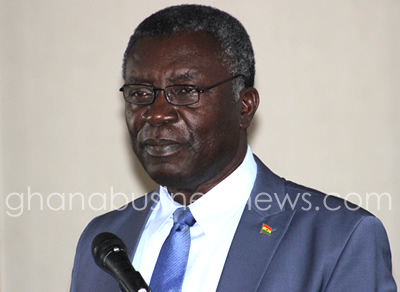MESTI/GIZ holds forum on sustainable plastic waste management
 Professor Kwabena Frimpong-Boateng, the Minister of Environment, Science, Technology and Innovation (MESTI) has advised Ghanaians to minimise their use of plastic products, and substitute them with degradable materials.
Professor Kwabena Frimpong-Boateng, the Minister of Environment, Science, Technology and Innovation (MESTI) has advised Ghanaians to minimise their use of plastic products, and substitute them with degradable materials.
He said since plastic was bio-non-degradable (do not decompose), they negatively affect the environment, destroying fertile lands and aquatic resources, polluting the air with poisonous gasses that causes severe damages to both human and animal health.
Prof. Frimpong-Boateng said it was estimated that by 2050, the oceans would contain more plastic than fish by weight, adding that its use in many developing countries including Ghana, had increased much more than the world’s average because of rapid urbanisation and economic development.
The Minister who was addressing participants at a stakeholders’ forum on sustainable plastic waste management, organised by the GIZ in collaboration with MESTI in Accra on Tuesday, said the amount of plastic waste being generated globally on daily basis was reaching alarming proportions.
The Environment Minister however said an immediate ban on the production and use of plastic in the country was not the solution, but rather advocated a gradual system of effective preparation and sustainable management through useful recycling of waste materials into productive goods.
He said the country could take advantage of the availability of raw materials to generate income, create jobs and turn plastic waste into creative and beneficial products for use.
The forum, therefore presented a platform for thorough discussions on current trends, emerging issues and best practices from across the world, and gave participants the opportunity to make imputs into the Ministry’s Zero Draft National Plastic Policy currently being developed, to make it more coherent and implementable.
Prof. Frimpong-Boateng attributed the rise in plastic waste to current economic growth, changing consumption and production patterns globally and Ghana was no exception.
He said the situation could however pose serious climate and environmental challenges if nothing was done about the situation. “According to the United Nations Environmental Programme (UNDP 2009), the world’s annual output of plastic waste was estimated at 100 million tons. Of this 10 million metric tonnes end up in the oceans”, he said.
The Ministry’s strategy in managing plastic will hinge on “reducing use, re-use, refuse single use recycle, and replacement, such as replacement of plastic shopping bags by cotton materials or paper”.
Ms Heather Troutman, the Project Manager for the development of the National Plastic Policy, gave a presentation on key areas captured under the Draft, which was designed to support sustainable development, job creation, recycling, technical as well as innovation among other things.
The Draft, she said also captured areas including the impact of plastic on the environment, the value chain, major challenges including lack of finance and market; possible solutions like progressive taxation, breakage services as well as domestic manufacture.
She said the Policy was also expected to have some strategic actions which looked at behaviour change, planning collaborations, resource mobilisation and governance, while setting timelines for all the achievement of set goals.
Source: GNA
